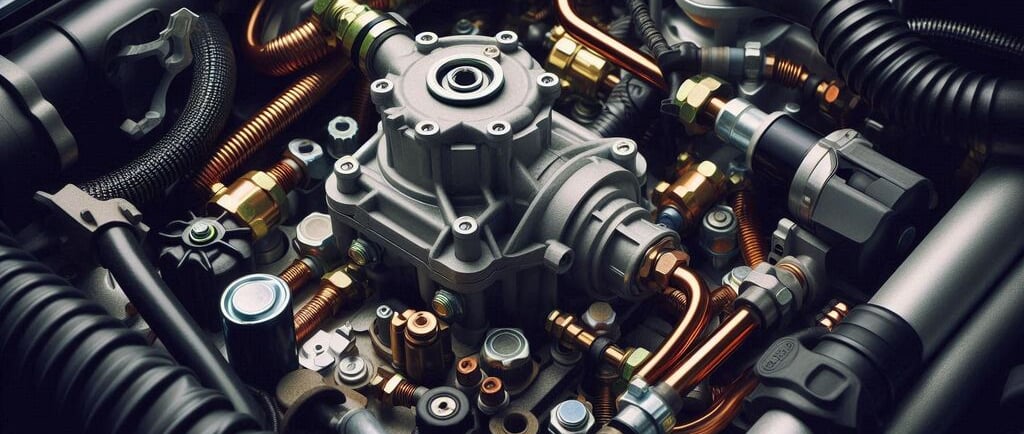Fuel Pump: Delivers fuel from the tank to the engine.
If you've ever had issues starting your car or noticed it sputtering on acceleration, a failing fuel pump might be to blame.
FUEL SYSTEMS
11/12/20244 min read


Fuel Pump: The Essential Component Delivering Fuel from the Tank to the Engine
If you've ever had issues starting your car or noticed it sputtering on acceleration, a failing fuel pump might be to blame. This small but essential component is responsible for moving fuel from your gas tank to your engine, helping to maintain steady performance and efficient fuel delivery. In this article, we’ll cover everything you need to know about fuel pumps, from how they work to tips for maintenance and troubleshooting.
What is a Fuel Pump and Why is It Important?
1. Role of the Fuel Pump
The fuel pump ensures your car has a continuous supply of fuel at the right pressure to the engine. Located in or near the fuel tank, it moves fuel through fuel lines to the engine, where it gets mixed with air for combustion.
A properly functioning fuel pump:
Delivers fuel consistently to support engine performance.
Maintains the correct fuel pressure for combustion.
Prevents fuel starvation, which can lead to engine stalling or failure.
Without a working fuel pump, your car wouldn’t run as fuel delivery is vital for your engine’s operation.
2. Types of Fuel Pumps
There are two primary types of fuel pumps used in modern vehicles:
Mechanical Fuel Pumps: Common in older vehicles, these pumps are driven by the engine’s camshaft or crankshaft, drawing fuel from the tank to the carburetor in a consistent flow.
Electric Fuel Pumps: Found in most modern vehicles, these pumps use electricity to pump fuel from the tank to the fuel injectors. Electric pumps are more efficient and can deliver fuel at higher pressure, making them ideal for fuel-injected engines.
Both types have unique features and may require different maintenance and troubleshooting approaches.
Signs of a Failing Fuel Pump
If your fuel pump begins to fail, you might notice some of the following symptoms:
Difficulty Starting
A weak fuel pump may struggle to deliver enough fuel to start the engine, especially if the vehicle has been idle for some time.Sputtering at High Speeds
If your car sputters when accelerating or maintaining high speeds, it might be a sign that the fuel pump isn’t delivering fuel consistently.Loss of Power When Under Strain
A fuel pump struggling to keep up may cause power loss when going uphill or accelerating rapidly.Poor Fuel Efficiency
If the fuel pump is sending excess fuel to the engine, it could lead to a drop in fuel economy.
These signs shouldn’t be ignored, as a failing fuel pump could eventually lead to a complete engine failure.
How to Maintain Your Fuel Pump
1. Keep Your Fuel Tank Full
Running on a low fuel level frequently can lead to premature wear of the fuel pump. The pump itself is kept cool by being submerged in fuel. When you run on low fuel, it overheats, which can cause damage over time. A good rule of thumb is to keep your gas tank at least a quarter full to avoid straining your fuel pump.
2. Use Quality Fuel
Using high-quality fuel is essential for fuel pump health. Lower-quality fuel may contain impurities that clog the fuel filter, making the pump work harder than necessary. This can lead to premature wear or even failure.
3. Replace Your Fuel Filter Regularly
A clogged fuel filter can restrict the flow of fuel to your engine, making the pump work harder to push fuel through. Changing your fuel filter regularly will reduce this strain and can prolong the lifespan of your fuel pump.
4. Avoid Excessive Heat
Exposing your vehicle to extreme heat can also impact the performance of your fuel pump. Excessive heat can cause fuel to vaporize and affect the pump’s functionality. Try to park in the shade or a garage during hot weather to reduce heat exposure.
Troubleshooting Fuel Pump Issues
If you’re experiencing issues that might stem from your fuel pump, here are a few troubleshooting steps:
Listen for the Fuel Pump
When you turn the ignition key to the “on” position (without starting the car), you should hear a quiet humming sound from the fuel tank area. This sound indicates that the fuel pump is working.Check Fuel Pressure
Testing fuel pressure can help identify a problem. Using a fuel pressure gauge, you can compare your vehicle’s fuel pressure to the manufacturer’s specifications. Low pressure may indicate a pump issue.Inspect the Fuel Relay and Fuse
Sometimes, what appears to be a fuel pump issue may be caused by a blown fuse or a faulty relay. Check these components first before assuming the fuel pump is at fault.Get a Professional Diagnosis
If you’ve tried these steps and still experience issues, it might be best to seek professional help. Mechanics have specialized equipment that can provide a thorough diagnostic.
Fuel Pump Replacement and Costs
1. When to Replace a Fuel Pump
Fuel pumps aren’t designed to last forever. Most will last between 100,000 and 150,000 miles, though this varies depending on driving conditions and maintenance. If your fuel pump shows signs of failure, it’s usually best to replace it to avoid further issues.
2. Cost of Fuel Pump Replacement
Fuel pump replacement costs vary depending on the make and model of the vehicle, with typical costs ranging from $400 to $800. While it may seem costly, a functioning fuel pump is essential for your car’s performance, and neglecting it can lead to even more expensive repairs.
Conclusion: Keep Your Fuel Pump in Top Shape
Your fuel pump is a crucial component of your vehicle, providing the engine with the fuel it needs to perform at its best. Regular maintenance, such as keeping your fuel tank adequately filled, using quality fuel, and changing the fuel filter, can prolong your fuel pump's life and help you avoid costly repairs.
If you notice any signs of a failing fuel pump, don’t wait to take action. Ignoring fuel pump issues could lead to complete engine failure, which would mean much higher repair costs. Take care of your fuel pump, and it will take care of you on the road.


